Was Australia invaded or settled?
VerifiedAdded on 2023/06/10
|7
|2164
|465
AI Summary
This essay analyzes the history of Australia and the events that went down in the late 17th century with regards to the Britishers to determine whether the country was settled or invaded. The report concludes that instead of getting peacefully settled, evidences point towards Australia being invaded instead.
Contribute Materials
Your contribution can guide someone’s learning journey. Share your
documents today.
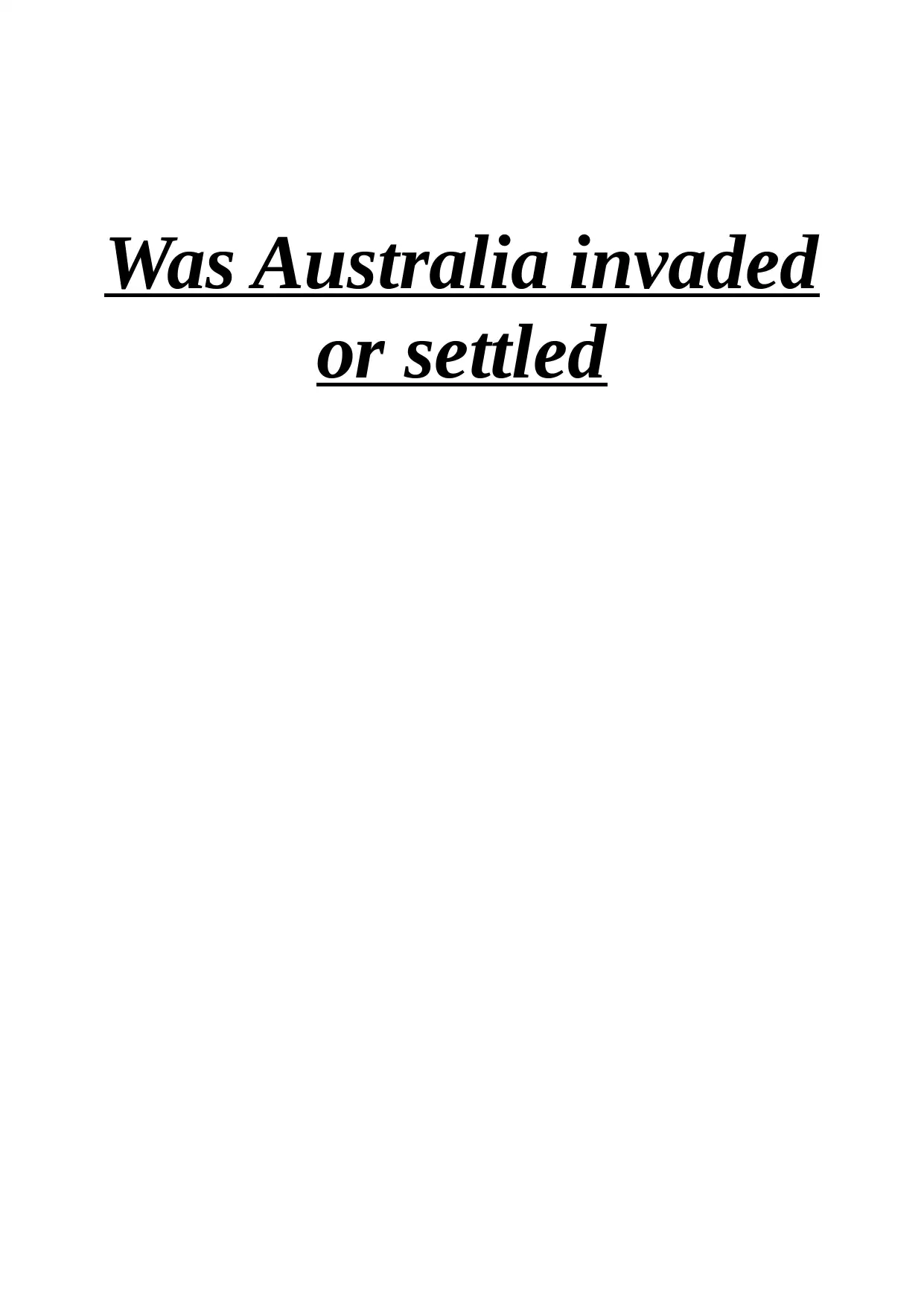
Was Australia invaded
or settled
or settled
Secure Best Marks with AI Grader
Need help grading? Try our AI Grader for instant feedback on your assignments.
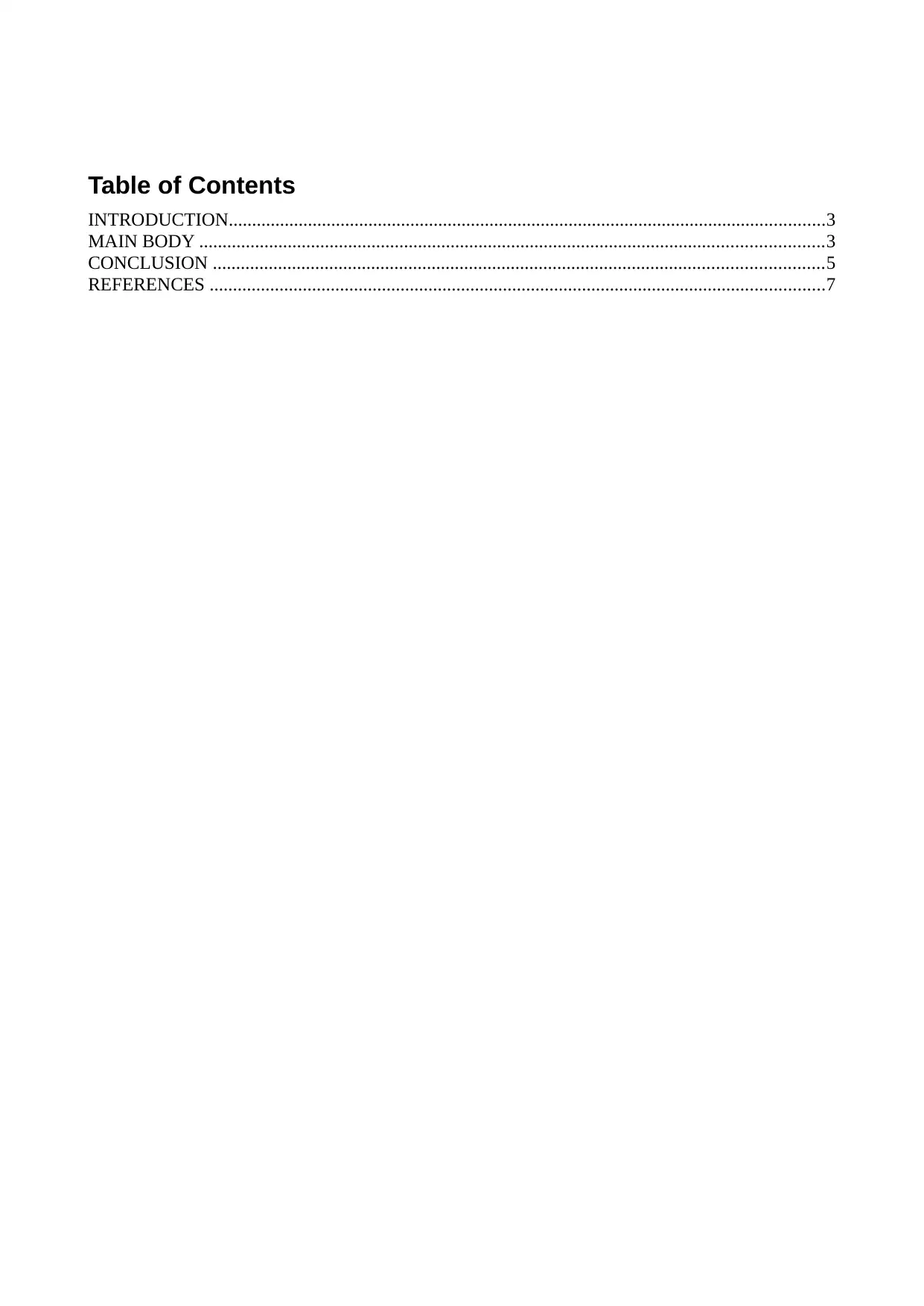
Table of Contents
INTRODUCTION................................................................................................................................3
MAIN BODY ......................................................................................................................................3
CONCLUSION ...................................................................................................................................5
REFERENCES ....................................................................................................................................7
INTRODUCTION................................................................................................................................3
MAIN BODY ......................................................................................................................................3
CONCLUSION ...................................................................................................................................5
REFERENCES ....................................................................................................................................7
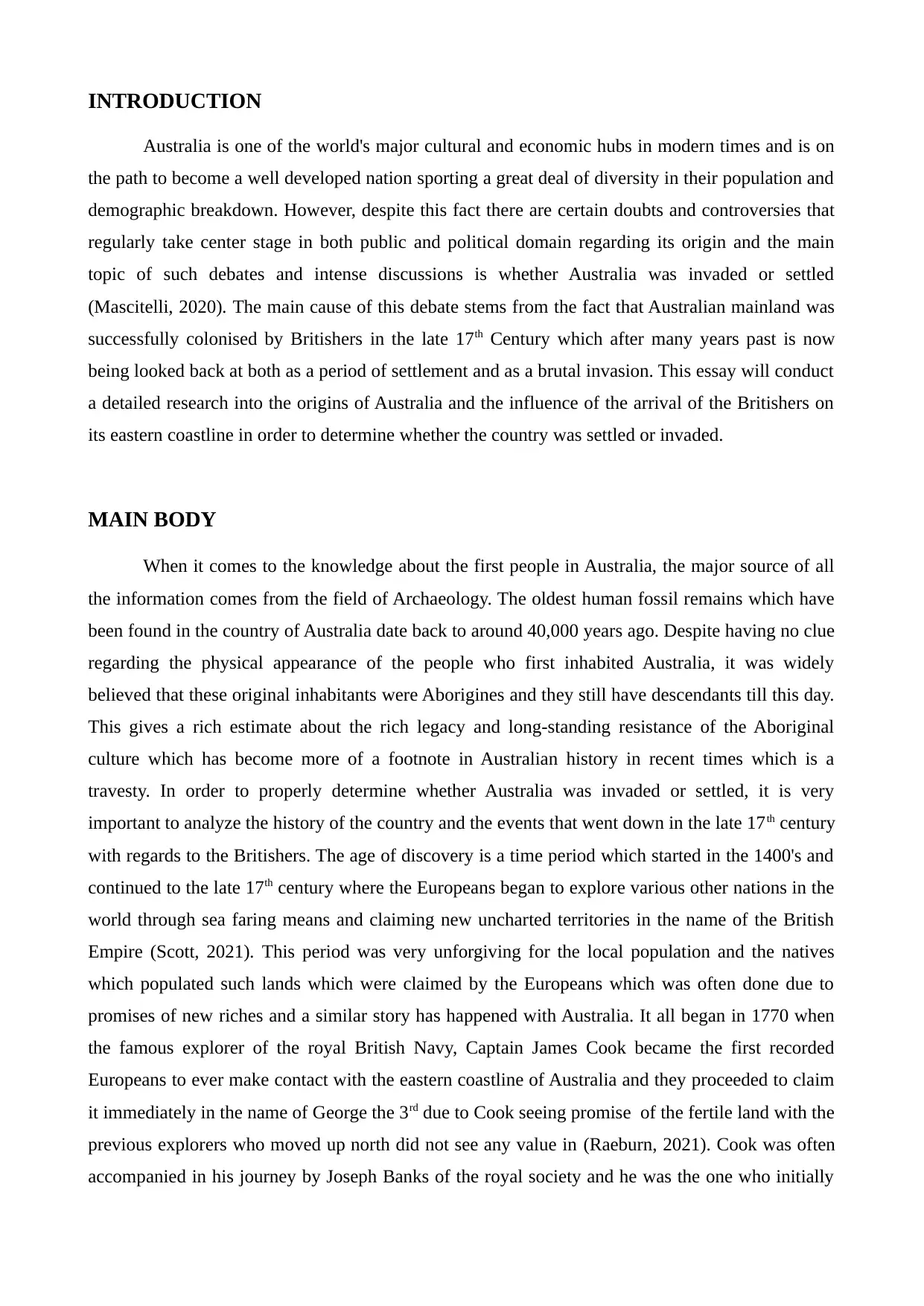
INTRODUCTION
Australia is one of the world's major cultural and economic hubs in modern times and is on
the path to become a well developed nation sporting a great deal of diversity in their population and
demographic breakdown. However, despite this fact there are certain doubts and controversies that
regularly take center stage in both public and political domain regarding its origin and the main
topic of such debates and intense discussions is whether Australia was invaded or settled
(Mascitelli, 2020). The main cause of this debate stems from the fact that Australian mainland was
successfully colonised by Britishers in the late 17th Century which after many years past is now
being looked back at both as a period of settlement and as a brutal invasion. This essay will conduct
a detailed research into the origins of Australia and the influence of the arrival of the Britishers on
its eastern coastline in order to determine whether the country was settled or invaded.
MAIN BODY
When it comes to the knowledge about the first people in Australia, the major source of all
the information comes from the field of Archaeology. The oldest human fossil remains which have
been found in the country of Australia date back to around 40,000 years ago. Despite having no clue
regarding the physical appearance of the people who first inhabited Australia, it was widely
believed that these original inhabitants were Aborigines and they still have descendants till this day.
This gives a rich estimate about the rich legacy and long-standing resistance of the Aboriginal
culture which has become more of a footnote in Australian history in recent times which is a
travesty. In order to properly determine whether Australia was invaded or settled, it is very
important to analyze the history of the country and the events that went down in the late 17th century
with regards to the Britishers. The age of discovery is a time period which started in the 1400's and
continued to the late 17th century where the Europeans began to explore various other nations in the
world through sea faring means and claiming new uncharted territories in the name of the British
Empire (Scott, 2021). This period was very unforgiving for the local population and the natives
which populated such lands which were claimed by the Europeans which was often done due to
promises of new riches and a similar story has happened with Australia. It all began in 1770 when
the famous explorer of the royal British Navy, Captain James Cook became the first recorded
Europeans to ever make contact with the eastern coastline of Australia and they proceeded to claim
it immediately in the name of George the 3rd due to Cook seeing promise of the fertile land with the
previous explorers who moved up north did not see any value in (Raeburn, 2021). Cook was often
accompanied in his journey by Joseph Banks of the royal society and he was the one who initially
Australia is one of the world's major cultural and economic hubs in modern times and is on
the path to become a well developed nation sporting a great deal of diversity in their population and
demographic breakdown. However, despite this fact there are certain doubts and controversies that
regularly take center stage in both public and political domain regarding its origin and the main
topic of such debates and intense discussions is whether Australia was invaded or settled
(Mascitelli, 2020). The main cause of this debate stems from the fact that Australian mainland was
successfully colonised by Britishers in the late 17th Century which after many years past is now
being looked back at both as a period of settlement and as a brutal invasion. This essay will conduct
a detailed research into the origins of Australia and the influence of the arrival of the Britishers on
its eastern coastline in order to determine whether the country was settled or invaded.
MAIN BODY
When it comes to the knowledge about the first people in Australia, the major source of all
the information comes from the field of Archaeology. The oldest human fossil remains which have
been found in the country of Australia date back to around 40,000 years ago. Despite having no clue
regarding the physical appearance of the people who first inhabited Australia, it was widely
believed that these original inhabitants were Aborigines and they still have descendants till this day.
This gives a rich estimate about the rich legacy and long-standing resistance of the Aboriginal
culture which has become more of a footnote in Australian history in recent times which is a
travesty. In order to properly determine whether Australia was invaded or settled, it is very
important to analyze the history of the country and the events that went down in the late 17th century
with regards to the Britishers. The age of discovery is a time period which started in the 1400's and
continued to the late 17th century where the Europeans began to explore various other nations in the
world through sea faring means and claiming new uncharted territories in the name of the British
Empire (Scott, 2021). This period was very unforgiving for the local population and the natives
which populated such lands which were claimed by the Europeans which was often done due to
promises of new riches and a similar story has happened with Australia. It all began in 1770 when
the famous explorer of the royal British Navy, Captain James Cook became the first recorded
Europeans to ever make contact with the eastern coastline of Australia and they proceeded to claim
it immediately in the name of George the 3rd due to Cook seeing promise of the fertile land with the
previous explorers who moved up north did not see any value in (Raeburn, 2021). Cook was often
accompanied in his journey by Joseph Banks of the royal society and he was the one who initially
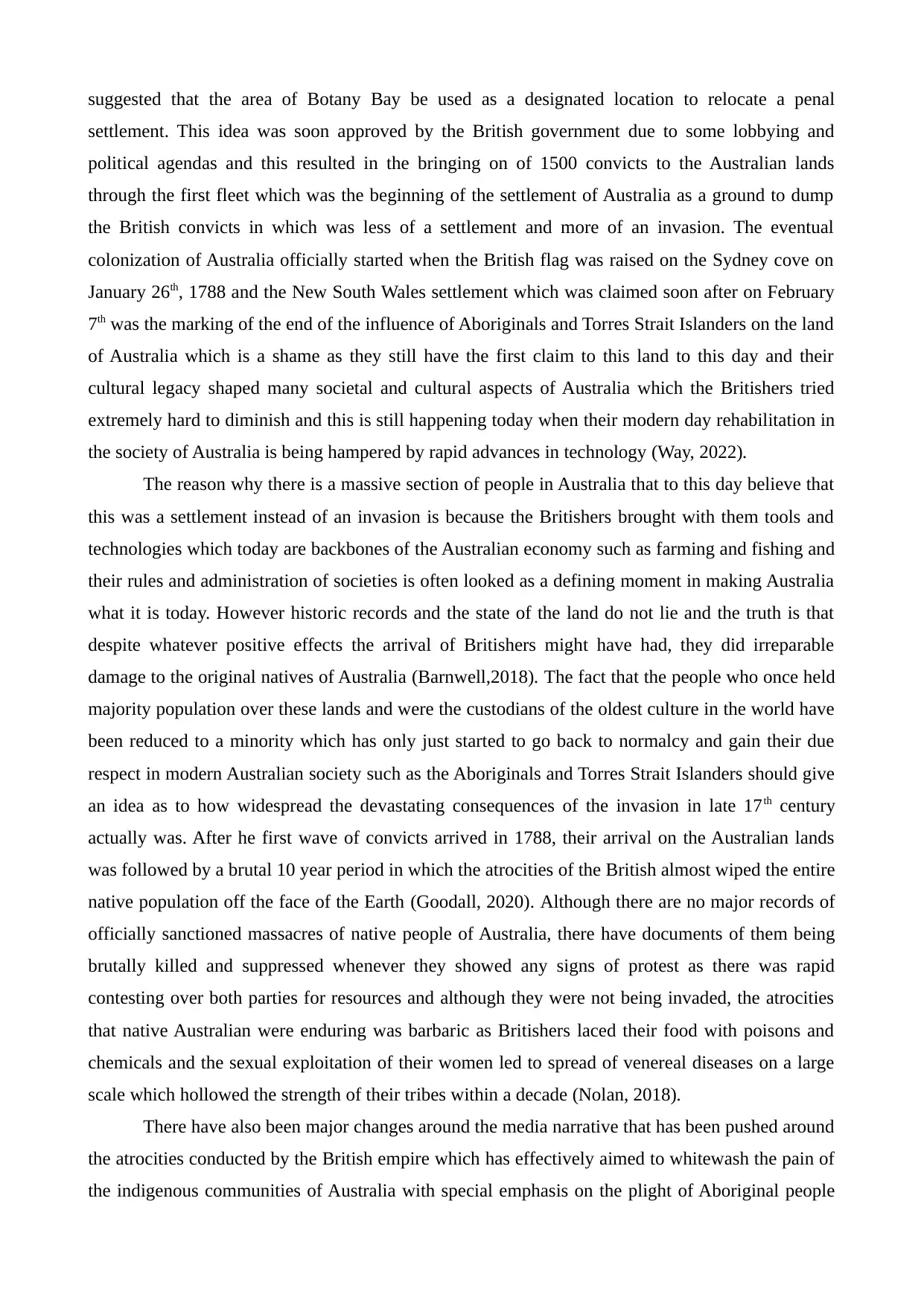
suggested that the area of Botany Bay be used as a designated location to relocate a penal
settlement. This idea was soon approved by the British government due to some lobbying and
political agendas and this resulted in the bringing on of 1500 convicts to the Australian lands
through the first fleet which was the beginning of the settlement of Australia as a ground to dump
the British convicts in which was less of a settlement and more of an invasion. The eventual
colonization of Australia officially started when the British flag was raised on the Sydney cove on
January 26th, 1788 and the New South Wales settlement which was claimed soon after on February
7th was the marking of the end of the influence of Aboriginals and Torres Strait Islanders on the land
of Australia which is a shame as they still have the first claim to this land to this day and their
cultural legacy shaped many societal and cultural aspects of Australia which the Britishers tried
extremely hard to diminish and this is still happening today when their modern day rehabilitation in
the society of Australia is being hampered by rapid advances in technology (Way, 2022).
The reason why there is a massive section of people in Australia that to this day believe that
this was a settlement instead of an invasion is because the Britishers brought with them tools and
technologies which today are backbones of the Australian economy such as farming and fishing and
their rules and administration of societies is often looked as a defining moment in making Australia
what it is today. However historic records and the state of the land do not lie and the truth is that
despite whatever positive effects the arrival of Britishers might have had, they did irreparable
damage to the original natives of Australia (Barnwell,2018). The fact that the people who once held
majority population over these lands and were the custodians of the oldest culture in the world have
been reduced to a minority which has only just started to go back to normalcy and gain their due
respect in modern Australian society such as the Aboriginals and Torres Strait Islanders should give
an idea as to how widespread the devastating consequences of the invasion in late 17th century
actually was. After he first wave of convicts arrived in 1788, their arrival on the Australian lands
was followed by a brutal 10 year period in which the atrocities of the British almost wiped the entire
native population off the face of the Earth (Goodall, 2020). Although there are no major records of
officially sanctioned massacres of native people of Australia, there have documents of them being
brutally killed and suppressed whenever they showed any signs of protest as there was rapid
contesting over both parties for resources and although they were not being invaded, the atrocities
that native Australian were enduring was barbaric as Britishers laced their food with poisons and
chemicals and the sexual exploitation of their women led to spread of venereal diseases on a large
scale which hollowed the strength of their tribes within a decade (Nolan, 2018).
There have also been major changes around the media narrative that has been pushed around
the atrocities conducted by the British empire which has effectively aimed to whitewash the pain of
the indigenous communities of Australia with special emphasis on the plight of Aboriginal people
settlement. This idea was soon approved by the British government due to some lobbying and
political agendas and this resulted in the bringing on of 1500 convicts to the Australian lands
through the first fleet which was the beginning of the settlement of Australia as a ground to dump
the British convicts in which was less of a settlement and more of an invasion. The eventual
colonization of Australia officially started when the British flag was raised on the Sydney cove on
January 26th, 1788 and the New South Wales settlement which was claimed soon after on February
7th was the marking of the end of the influence of Aboriginals and Torres Strait Islanders on the land
of Australia which is a shame as they still have the first claim to this land to this day and their
cultural legacy shaped many societal and cultural aspects of Australia which the Britishers tried
extremely hard to diminish and this is still happening today when their modern day rehabilitation in
the society of Australia is being hampered by rapid advances in technology (Way, 2022).
The reason why there is a massive section of people in Australia that to this day believe that
this was a settlement instead of an invasion is because the Britishers brought with them tools and
technologies which today are backbones of the Australian economy such as farming and fishing and
their rules and administration of societies is often looked as a defining moment in making Australia
what it is today. However historic records and the state of the land do not lie and the truth is that
despite whatever positive effects the arrival of Britishers might have had, they did irreparable
damage to the original natives of Australia (Barnwell,2018). The fact that the people who once held
majority population over these lands and were the custodians of the oldest culture in the world have
been reduced to a minority which has only just started to go back to normalcy and gain their due
respect in modern Australian society such as the Aboriginals and Torres Strait Islanders should give
an idea as to how widespread the devastating consequences of the invasion in late 17th century
actually was. After he first wave of convicts arrived in 1788, their arrival on the Australian lands
was followed by a brutal 10 year period in which the atrocities of the British almost wiped the entire
native population off the face of the Earth (Goodall, 2020). Although there are no major records of
officially sanctioned massacres of native people of Australia, there have documents of them being
brutally killed and suppressed whenever they showed any signs of protest as there was rapid
contesting over both parties for resources and although they were not being invaded, the atrocities
that native Australian were enduring was barbaric as Britishers laced their food with poisons and
chemicals and the sexual exploitation of their women led to spread of venereal diseases on a large
scale which hollowed the strength of their tribes within a decade (Nolan, 2018).
There have also been major changes around the media narrative that has been pushed around
the atrocities conducted by the British empire which has effectively aimed to whitewash the pain of
the indigenous communities of Australia with special emphasis on the plight of Aboriginal people
Secure Best Marks with AI Grader
Need help grading? Try our AI Grader for instant feedback on your assignments.
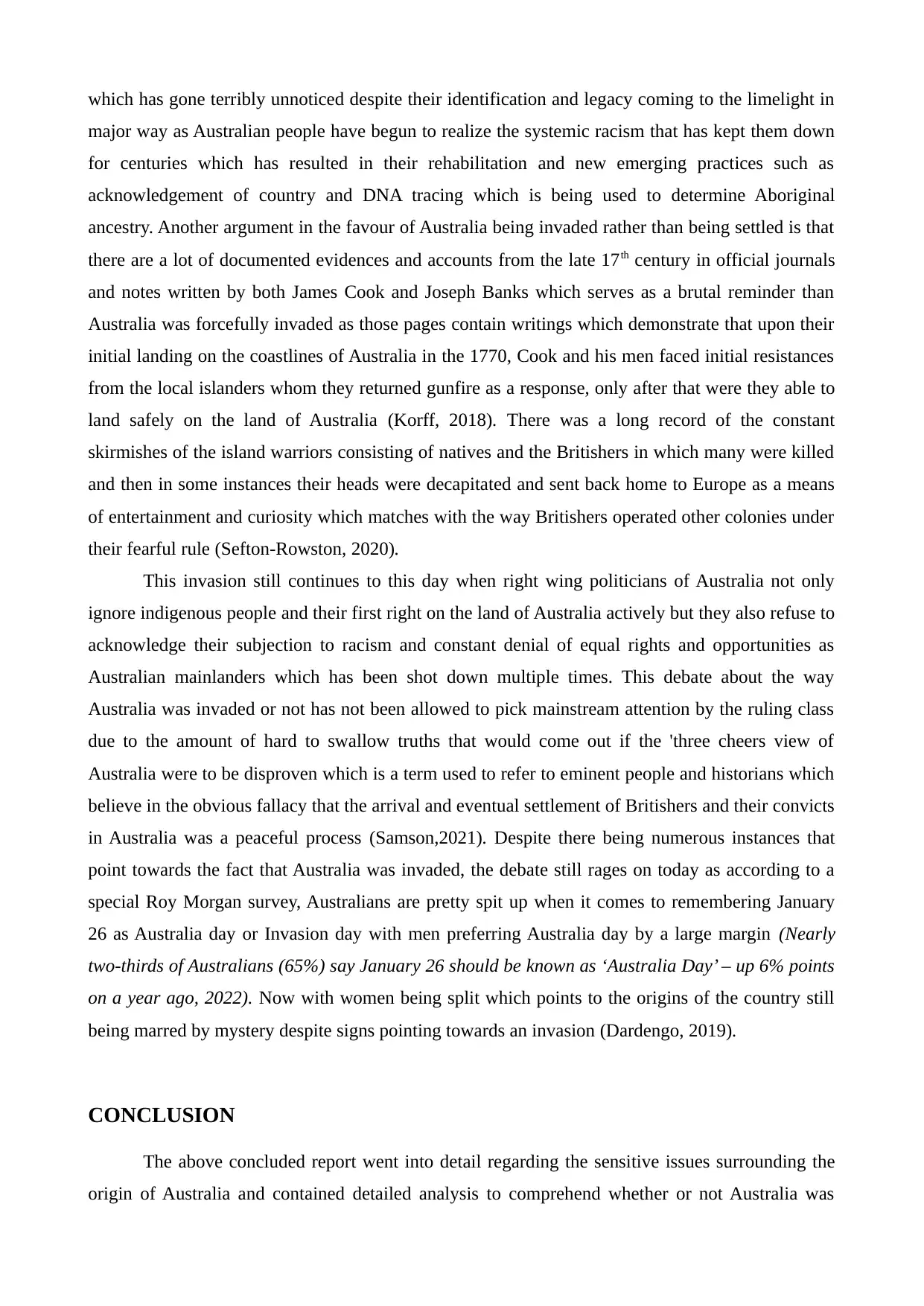
which has gone terribly unnoticed despite their identification and legacy coming to the limelight in
major way as Australian people have begun to realize the systemic racism that has kept them down
for centuries which has resulted in their rehabilitation and new emerging practices such as
acknowledgement of country and DNA tracing which is being used to determine Aboriginal
ancestry. Another argument in the favour of Australia being invaded rather than being settled is that
there are a lot of documented evidences and accounts from the late 17th century in official journals
and notes written by both James Cook and Joseph Banks which serves as a brutal reminder than
Australia was forcefully invaded as those pages contain writings which demonstrate that upon their
initial landing on the coastlines of Australia in the 1770, Cook and his men faced initial resistances
from the local islanders whom they returned gunfire as a response, only after that were they able to
land safely on the land of Australia (Korff, 2018). There was a long record of the constant
skirmishes of the island warriors consisting of natives and the Britishers in which many were killed
and then in some instances their heads were decapitated and sent back home to Europe as a means
of entertainment and curiosity which matches with the way Britishers operated other colonies under
their fearful rule (Sefton-Rowston, 2020).
This invasion still continues to this day when right wing politicians of Australia not only
ignore indigenous people and their first right on the land of Australia actively but they also refuse to
acknowledge their subjection to racism and constant denial of equal rights and opportunities as
Australian mainlanders which has been shot down multiple times. This debate about the way
Australia was invaded or not has not been allowed to pick mainstream attention by the ruling class
due to the amount of hard to swallow truths that would come out if the 'three cheers view of
Australia were to be disproven which is a term used to refer to eminent people and historians which
believe in the obvious fallacy that the arrival and eventual settlement of Britishers and their convicts
in Australia was a peaceful process (Samson,2021). Despite there being numerous instances that
point towards the fact that Australia was invaded, the debate still rages on today as according to a
special Roy Morgan survey, Australians are pretty spit up when it comes to remembering January
26 as Australia day or Invasion day with men preferring Australia day by a large margin (Nearly
two-thirds of Australians (65%) say January 26 should be known as ‘Australia Day’ – up 6% points
on a year ago, 2022). Now with women being split which points to the origins of the country still
being marred by mystery despite signs pointing towards an invasion (Dardengo, 2019).
CONCLUSION
The above concluded report went into detail regarding the sensitive issues surrounding the
origin of Australia and contained detailed analysis to comprehend whether or not Australia was
major way as Australian people have begun to realize the systemic racism that has kept them down
for centuries which has resulted in their rehabilitation and new emerging practices such as
acknowledgement of country and DNA tracing which is being used to determine Aboriginal
ancestry. Another argument in the favour of Australia being invaded rather than being settled is that
there are a lot of documented evidences and accounts from the late 17th century in official journals
and notes written by both James Cook and Joseph Banks which serves as a brutal reminder than
Australia was forcefully invaded as those pages contain writings which demonstrate that upon their
initial landing on the coastlines of Australia in the 1770, Cook and his men faced initial resistances
from the local islanders whom they returned gunfire as a response, only after that were they able to
land safely on the land of Australia (Korff, 2018). There was a long record of the constant
skirmishes of the island warriors consisting of natives and the Britishers in which many were killed
and then in some instances their heads were decapitated and sent back home to Europe as a means
of entertainment and curiosity which matches with the way Britishers operated other colonies under
their fearful rule (Sefton-Rowston, 2020).
This invasion still continues to this day when right wing politicians of Australia not only
ignore indigenous people and their first right on the land of Australia actively but they also refuse to
acknowledge their subjection to racism and constant denial of equal rights and opportunities as
Australian mainlanders which has been shot down multiple times. This debate about the way
Australia was invaded or not has not been allowed to pick mainstream attention by the ruling class
due to the amount of hard to swallow truths that would come out if the 'three cheers view of
Australia were to be disproven which is a term used to refer to eminent people and historians which
believe in the obvious fallacy that the arrival and eventual settlement of Britishers and their convicts
in Australia was a peaceful process (Samson,2021). Despite there being numerous instances that
point towards the fact that Australia was invaded, the debate still rages on today as according to a
special Roy Morgan survey, Australians are pretty spit up when it comes to remembering January
26 as Australia day or Invasion day with men preferring Australia day by a large margin (Nearly
two-thirds of Australians (65%) say January 26 should be known as ‘Australia Day’ – up 6% points
on a year ago, 2022). Now with women being split which points to the origins of the country still
being marred by mystery despite signs pointing towards an invasion (Dardengo, 2019).
CONCLUSION
The above concluded report went into detail regarding the sensitive issues surrounding the
origin of Australia and contained detailed analysis to comprehend whether or not Australia was
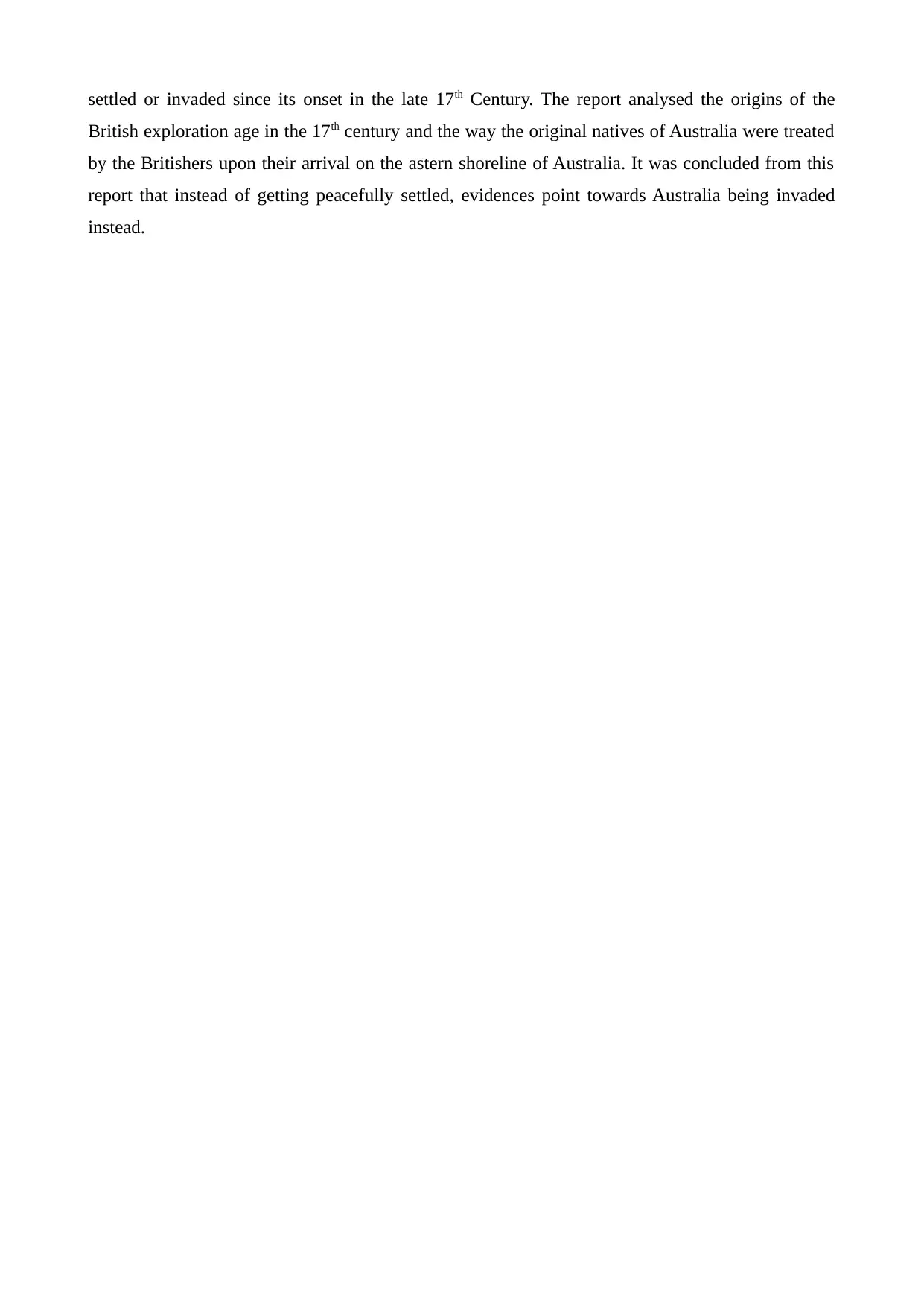
settled or invaded since its onset in the late 17th Century. The report analysed the origins of the
British exploration age in the 17th century and the way the original natives of Australia were treated
by the Britishers upon their arrival on the astern shoreline of Australia. It was concluded from this
report that instead of getting peacefully settled, evidences point towards Australia being invaded
instead.
British exploration age in the 17th century and the way the original natives of Australia were treated
by the Britishers upon their arrival on the astern shoreline of Australia. It was concluded from this
report that instead of getting peacefully settled, evidences point towards Australia being invaded
instead.
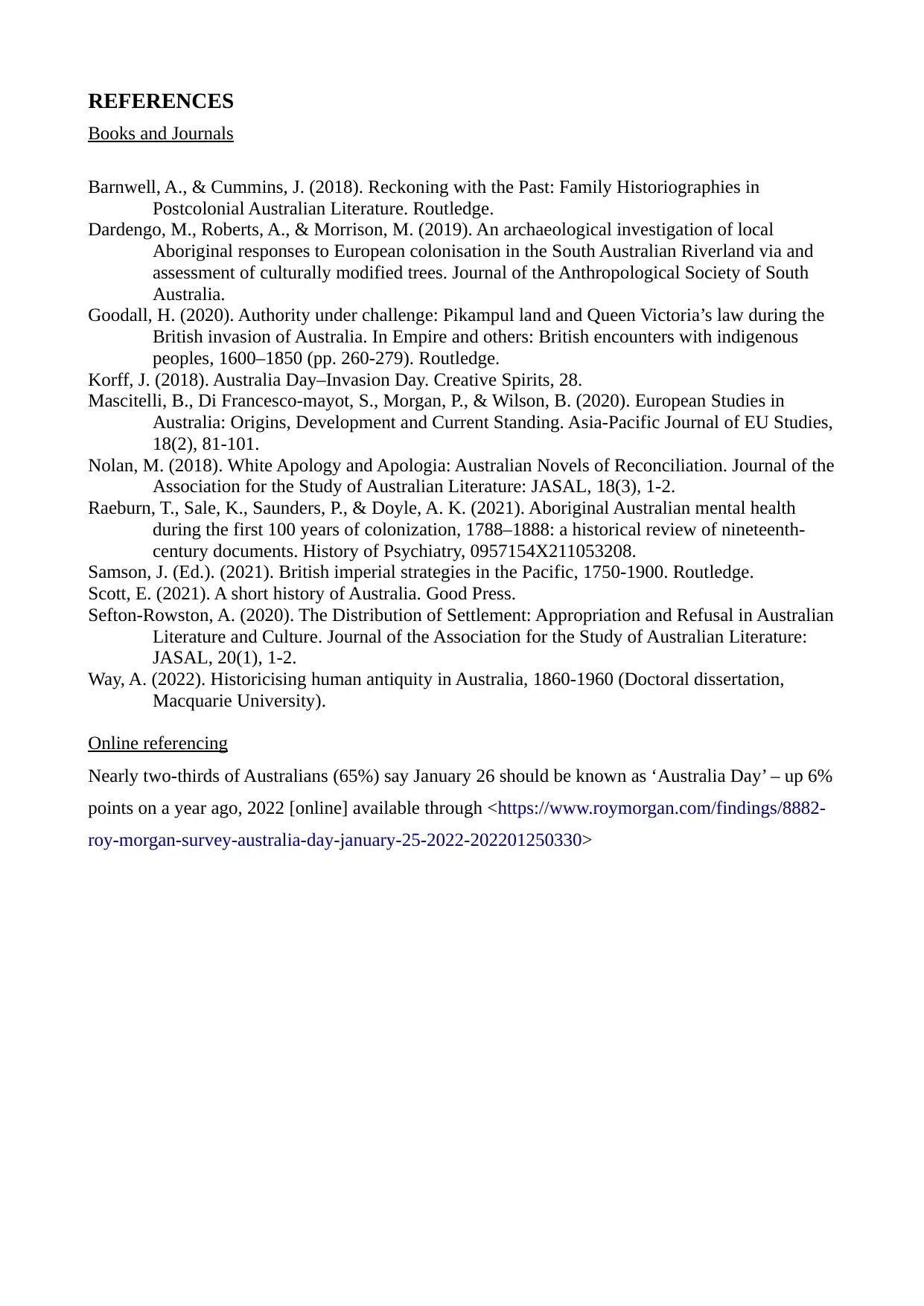
REFERENCES
Books and Journals
Barnwell, A., & Cummins, J. (2018). Reckoning with the Past: Family Historiographies in
Postcolonial Australian Literature. Routledge.
Dardengo, M., Roberts, A., & Morrison, M. (2019). An archaeological investigation of local
Aboriginal responses to European colonisation in the South Australian Riverland via and
assessment of culturally modified trees. Journal of the Anthropological Society of South
Australia.
Goodall, H. (2020). Authority under challenge: Pikampul land and Queen Victoria’s law during the
British invasion of Australia. In Empire and others: British encounters with indigenous
peoples, 1600–1850 (pp. 260-279). Routledge.
Korff, J. (2018). Australia Day–Invasion Day. Creative Spirits, 28.
Mascitelli, B., Di Francesco-mayot, S., Morgan, P., & Wilson, B. (2020). European Studies in
Australia: Origins, Development and Current Standing. Asia-Pacific Journal of EU Studies,
18(2), 81-101.
Nolan, M. (2018). White Apology and Apologia: Australian Novels of Reconciliation. Journal of the
Association for the Study of Australian Literature: JASAL, 18(3), 1-2.
Raeburn, T., Sale, K., Saunders, P., & Doyle, A. K. (2021). Aboriginal Australian mental health
during the first 100 years of colonization, 1788–1888: a historical review of nineteenth-
century documents. History of Psychiatry, 0957154X211053208.
Samson, J. (Ed.). (2021). British imperial strategies in the Pacific, 1750-1900. Routledge.
Scott, E. (2021). A short history of Australia. Good Press.
Sefton-Rowston, A. (2020). The Distribution of Settlement: Appropriation and Refusal in Australian
Literature and Culture. Journal of the Association for the Study of Australian Literature:
JASAL, 20(1), 1-2.
Way, A. (2022). Historicising human antiquity in Australia, 1860-1960 (Doctoral dissertation,
Macquarie University).
Online referencing
Nearly two-thirds of Australians (65%) say January 26 should be known as ‘Australia Day’ – up 6%
points on a year ago, 2022 [online] available through <https://www.roymorgan.com/findings/8882-
roy-morgan-survey-australia-day-january-25-2022-202201250330>
Books and Journals
Barnwell, A., & Cummins, J. (2018). Reckoning with the Past: Family Historiographies in
Postcolonial Australian Literature. Routledge.
Dardengo, M., Roberts, A., & Morrison, M. (2019). An archaeological investigation of local
Aboriginal responses to European colonisation in the South Australian Riverland via and
assessment of culturally modified trees. Journal of the Anthropological Society of South
Australia.
Goodall, H. (2020). Authority under challenge: Pikampul land and Queen Victoria’s law during the
British invasion of Australia. In Empire and others: British encounters with indigenous
peoples, 1600–1850 (pp. 260-279). Routledge.
Korff, J. (2018). Australia Day–Invasion Day. Creative Spirits, 28.
Mascitelli, B., Di Francesco-mayot, S., Morgan, P., & Wilson, B. (2020). European Studies in
Australia: Origins, Development and Current Standing. Asia-Pacific Journal of EU Studies,
18(2), 81-101.
Nolan, M. (2018). White Apology and Apologia: Australian Novels of Reconciliation. Journal of the
Association for the Study of Australian Literature: JASAL, 18(3), 1-2.
Raeburn, T., Sale, K., Saunders, P., & Doyle, A. K. (2021). Aboriginal Australian mental health
during the first 100 years of colonization, 1788–1888: a historical review of nineteenth-
century documents. History of Psychiatry, 0957154X211053208.
Samson, J. (Ed.). (2021). British imperial strategies in the Pacific, 1750-1900. Routledge.
Scott, E. (2021). A short history of Australia. Good Press.
Sefton-Rowston, A. (2020). The Distribution of Settlement: Appropriation and Refusal in Australian
Literature and Culture. Journal of the Association for the Study of Australian Literature:
JASAL, 20(1), 1-2.
Way, A. (2022). Historicising human antiquity in Australia, 1860-1960 (Doctoral dissertation,
Macquarie University).
Online referencing
Nearly two-thirds of Australians (65%) say January 26 should be known as ‘Australia Day’ – up 6%
points on a year ago, 2022 [online] available through <https://www.roymorgan.com/findings/8882-
roy-morgan-survey-australia-day-january-25-2022-202201250330>
1 out of 7
Related Documents
Your All-in-One AI-Powered Toolkit for Academic Success.
+13062052269
info@desklib.com
Available 24*7 on WhatsApp / Email
![[object Object]](/_next/static/media/star-bottom.7253800d.svg)
Unlock your academic potential
© 2024 | Zucol Services PVT LTD | All rights reserved.





